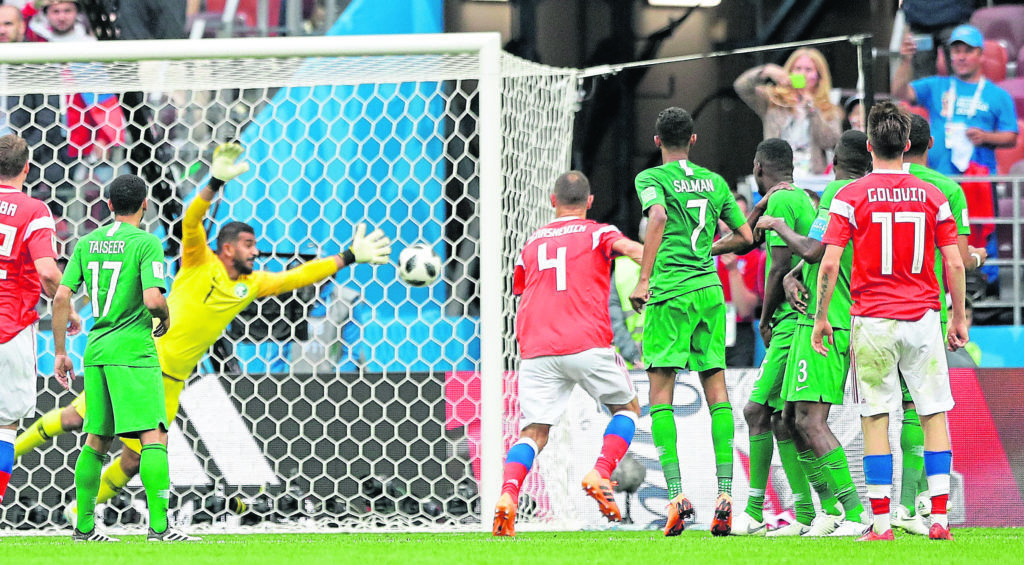
Pub quiz time. What is the connection between the opening game at the World Cup in June and the fact that we are now heading towards 140p a litre at the pumps, and rising?
Those whose eyes were not entirely concentrated on Robbie Williams singing before the game or the ensuing 5-0 rout of Saudi Arabia by Russia might have noticed the warm body language between the presidents of the two countries – Sheikh Mohammed bin Salman and Vladimir Putin respectively.
Ostensibly, there should have been little common ground for them to share, even leaving aside the lop-sided result. Saudi Arabia is firmly in the US camp in Middle East diplomacy and is on the “other side” to Russia in conflicts as complex as Syria and Yemen.
However, there is more to international relations than geopolitics or even football. There is oil and the immense wealth and influence which it provides. It is primarily through oil that Saudi Arabia and Russia have, particularly in recent months, been brought much closer in common cause.
Perhaps if US President Donald Trump had been watching the World Cup rather than, as I recall, fending off Stormy Daniels around that time, he too would have picked up on an inconvenient reality – that when it comes to turning up production in order to hold down the price of oil, Saudi Arabia may not be entirely at his beck and call.
What was interesting in June is now highly pertinent in October, just a month away from the implementation of full – and, by all accounts, extremely tight – US sanctions against Iran.
The Algiers meeting between OPEC and Russia has brought into focus the fact that neither party is minded to turn the tap on to fill the void which the loss of Iranian exports will seriously exacerbate. In an industry not noted for its global unity, it was a remarkably firm rebuff to what Mr Trump was demanding.
Of course, there is still plenty room for manoeuvres and changes of direction. US pressures on the Saudis will increase with Mr Trump already tweeting angrily about the lack of gratitude for the military protection which the US provides for the House of Saud and other “friendly” Middle Eastern potentates, notably the UAE.
On September 20, Mr Trump tweeted: “We protect the countries of the Middle East, they would not be safe for very long without us, and yet they continue to push for higher and higher oil prices! We will remember. The OPEC monopoly must get prices down now!”.
However, tweets and exclamation marks did not have the desired effect and OPEC, including the Saudis as leading producer, held firm in Algiers. The immediate consequence was for the price of Brent to go above $80 a barrel, its highest point since 2014 – and that is before sanctions on Iran really start to bite.
As prices soar, Russia will be tempted to ease its own economic problems by increasing production and revenues. What neither it nor Saudi Arabia is prepared to do is provide the guarantees of increased production which Mr Trump is counting on to stabilise oil prices and negate the effects of his own hand-crafted policy of inflicting sanctions on Iran.
There are no certainties – and the inevitable result of uncertainty is that prices will continue to edge upwards without any consensus on where they might stop. Some leading traders have forecast that they could spike at about $100 a barrel. With other major producers like Venezuela and Libya in permanent crisis, why stop there?
With enough wars, coups and sanctions, they might even get to the $114 which was promised as “average” in the Scottish Government’s infamous 2014 White Paper – though crossing one’s fingers in the hope of sufficient conflicts around the globe to keep the oil price high is still not a sound basis for planning a nation’s future.
Even by Mr Trump’s standards, it does seem odd that he sees no contradiction in demanding lower oil prices while implementing sanctions on Iran in the face of international opposition, not least from the European Union. So far, the US has refused to permit any “exemptions” which would ease the pressure on Iranian exports and, hence, on the oil price. Could that change?
Certainly, it is ironic that, in the shifting sands of Middle East politics, the immediate effect of Mr Trump’s belligerence has been to push Saudi Arabia closer to Russia through their shared interest in keeping the oil price high. The Saudis, now looking to their post-oil future, may calculate that there is more to survival than being a US client state.
The pernicious aspect of US sanctions is that they seek to impose their will on friends as well as foes by threatening retribution against companies from any third country which dares deal with Iran – the same tactic they have long applied to Cuba with largely counter-productive effect, certainly in political terms. And Iran is a lot stronger economically than Cuba.
Which takes me back to the World Cup.
My son and I were at the second game of the tournament which was between Iran and Morocco in St Petersburg. The huge Iranian contingent seemed neither oppressed nor impoverished. The women favoured Dolce&Gabbana even though the pictures on their tournament ID (taken in Iran) showed them in demure black.
As anyone who has visited Iran will confirm, it is a complex society with far greater diversity than is represented by the images we are usually offered. Diplomacy should build on that reality.
However, the one thing that is guaranteed to unite Iran is opposition to sanctions imposed by the foreign power which has inflicted so much damage in the past.
Somebody should tell Mr Trump.
Recommended for you
